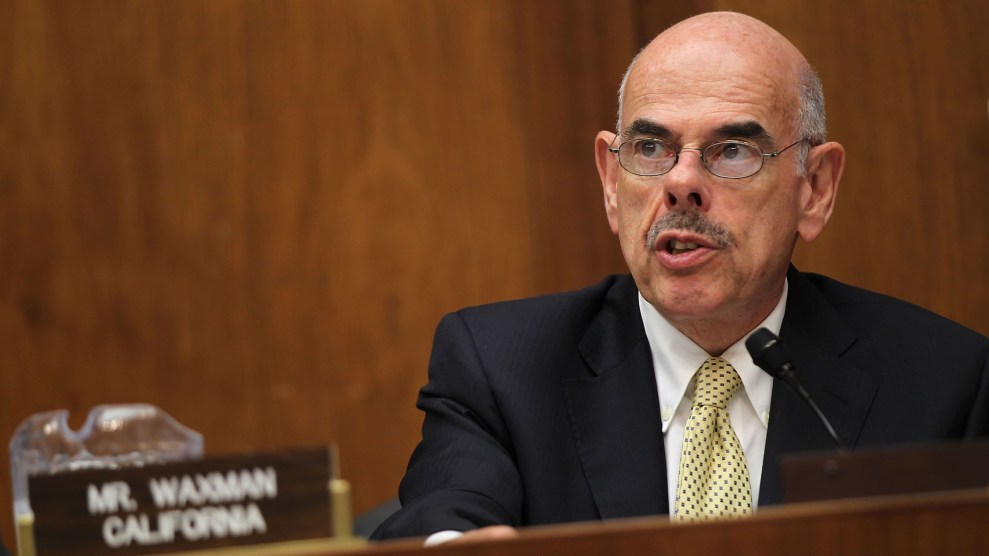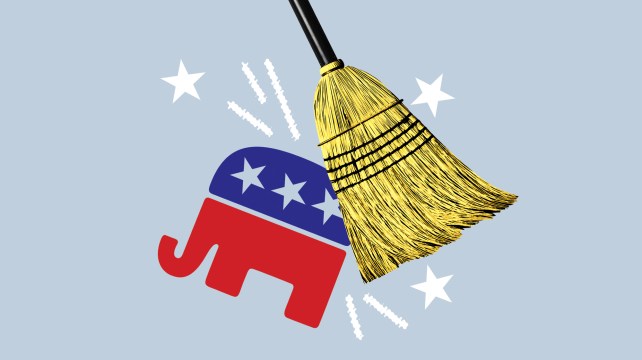
Alex Wong/Getty
Twelve years ago, Democrats won control of Congress in a landslide midterm election. It was six years into the unpopular George W. Bush administration. The war in Iraq was dragging on, the administration had bungled its response to Hurricane Katrina, and a top executive official had leaked the identity of CIA agent Valerie Plame for what appeared to be political retribution against her husband.
Today, Democrats are hoping for a repeat of the wave election of 2006. If they retake the House of Representatives, which polls show is likely, they will once again have the ability to investigate a Republican administration and subpoena documents and government officials. There are tantalizing targets on the horizon. Democrats have already raised the prospect of investigating allegations of assault against Supreme Court Justice Brett Kavanaugh. There are myriad questions around President Donald Trump’s personal finances, including his financial ties to Russia and Saudi Arabia and his reported history of tax fraud. There’s government waste, from Housing and Urban Development Secretary Ben Carson’s $31,000 dining set to private planes chartered by Interior Secretary Ryan Zinke.
And then there are the policy matters that have already attracted legal challenges, including the origins of the travel ban and the details of the family separation policy, as well as the disastrous response to Hurricane Maria.
When Democrats took charge of Congress in January 2007, one of the party’s lead investigators was Rep. Henry Waxman (D-Calif.), who became chair of the Oversight and Government Reform Committee. Waxman, who had been elected to Congress in 1974, another Democratic wave year that followed President Richard Nixon’s resignation, quickly set to work. According to Politico, just four months into his term as chairman, Waxman had already “opened investigations into potential Hatch Act violations by political appointees at the General Services Administration, requested all the e-mails on the Republican National Committee servers written by White House staff members and reviewed contracting in Iraq, among other hot spots.”
When Waxman retired in 2014, he had built a reputation as one of Capitol Hill’s fiercest inquisitors. Today, his investigatory know-how is back in demand. “I’m in touch with some of the people as they think through the possibilities of having a Democratic majority and being able to do things, set the agenda,” he said in an interview last week in the Washington office of his consultancy firm, Waxman Strategies. Waxman shared his views on what Democrats should and should not do if they take control of the House next month.
Mother Jones: What are some of the big-picture ways you talk to Democrats about how to navigate investigations of a GOP administration?
Henry Waxman: My No. 1 recommendation is not to approach oversight as a partisan issue. It has to be done legitimately. It has to be done fairly. And the Democrats get to set the agenda, so they can pick and choose topics, some of which they can foresee and others that will come up as events proceed. But any investigation that looks partisan lacks credibility.
MJ: How do you avoid having an investigation devolve into a partisan back-and-forth?
HW: It used to be—this is a fact nobody seems to know—even in the days of Sen. McCarthy, when he did his witch-hunt hearings, chairmen didn’t have unilateral power to issue subpoenas. Even Joe McCarthy would have had to either get the ranking [Democrat] on the Senate committee to agree to a subpoena being issued or call a committee meeting and have a majority of the committee vote to issue the subpoena. And same would be true about releasing confidential information. [McCarthy often issued subpoenas unilaterally nonetheless.]
But the Republicans in the House under Dan Burton, who was chairman [of oversight in the 1990s] and handled some of the most irresponsible investigations ever, when he took over, they changed the rules in the Oversight Committee to say the chairman could issue a subpoena. And he was issuing subpoenas the way most chairmen would issue a letter of request for information. He just subpoenaed documents. He subpoenaed people to come before the committee, using the full intrusive power of government to do whatever he wanted and get any information he wanted, whether he needed or not, or was entitled to it or not.
One person should not have that kind of power. When I took over the chairmanship of the full Oversight Committee, those rules were in place. And we didn’t change the rules, but I never followed those rules. Whenever I wanted to issue a subpoena, I either got the ranking member to go along with me, or I asked for a vote of the committee. So that’s an easy way to avoid the misuse of power. But misuse of power isn’t always the rules that you put in place, but the self-restraint that people would have in exercising that power in a responsible way. And that’s what I hope Democrats would do, and expect Democrats would do, with the oversight responsibility.
MJ: If Democrats win, it will be because a lot of people are having this really strong reaction to Trump. Don’t you think Democrats will feel pressure to investigate Trump aggressively?
HW: I think it’s important for them to do it. But they have to do it in a way that is fair. And the best way to learn how not to do it is to see how the Republicans have conducted their oversight. The House Intelligence Committee voted for a position on a Republican-only majority [vote] that said, as I recall, something to the effect that Russia was not involved. That’s incredible. They had no credibility, but they just acted in a partisan way.
Democrats ought to look at that question: Were the Russians involved in trying to influence our elections? Did President Trump work with them to interfere in the election? Did he or his campaign team cooperate? What role did we play in subverting the elections, and what role is being played now by trying to keep people from voting and using their constitutional rights to elect their representatives? These are legitimate topics, and I think they’re very important, because they go to the essence of our representative democracy.
MJ: What do you make of the issue of Justice Kavanaugh? Since the FBI investigation was curtailed by the White House, there’s been talk of trying to reopen that or have another investigation. Do you feel like that would be wise?
HW: I haven’t given it a lot of thought.
MJ: The idea is that the FBI didn’t actually have a chance to investigate the allegations against Kavanaugh.
HW: Okay, so that appears to be the case. And let’s say you have a hearing and established it. Then what? I’m not excited about that kind of hearing, because it seems to me there are a lot of things to cover.
MJ: Do you think Democrats should use their investigative powers to try to make Trump’s tax returns public?
HW: Donald Trump the candidate should have made his tax returns public. He said he was waiting for an audit, it would happen very soon, and then he could make them public. And then it was clear that he was never going to make them public. So I guess we have to accept the fact that he is not going to make it public. And so maybe the Ways and Means Committee would want to see what impact some of the tax laws have had for him as they look at the way the tax laws have been enforced. Jared Kushner, it was reported in the newspaper that he hasn’t paid taxes in years. How could that be? Is it that we’ve written in too many loopholes, and we ought to examine those loopholes again? Because it seems to me everybody ought to be paying taxes, and those who make the most ought to be paying the most in taxes, not getting away with paying nothing. Which seems to be a Trump family goal.
RELATED: Unleash the Investigations!
What Dems Could Do If They Win the House
Elections have consequences.
MJ: It sounds like you’re saying there are ways to look at their taxes within the context of legitimate oversight of something like the tax code.
HW: I would think that’s a possibility.
MJ: So basically, rather than say, “We’re coming for your taxes,” they should say, “We need to understand how the system works and make sure there is not blatant personal enrichment going on.”
HW: Absolutely. If you just say, “I’m going to now use the power of the Congress to get his tax returns, and we’re going to make it public, and then I’m going to hold a hearing on how the FBI didn’t do its job in investigating Kavanaugh, and then I’m going to look at Trump’s daughter’s line of products”—I mean, this looks like they’re going after him personally, and that’s not the way oversight should be conducted.
MJ: In 2007, when you became chairman, what was the importance of coming up with a template for areas to investigate? Something like Valerie Plame is obviously very political, or the Iraq War is very political. How do you pick and choose, or frame it in a way that works?
HW: Well, we framed it in terms of going after waste, fraud, and abuse of government funds, whether the government is living up to its responsibility in enforcing the law, and trying to hold people accountable. And within that framework, we had a whole series of hearings on the waste of money. They put stacks and stacks of hundred-dollar bills and freighted them to Baghdad and were handed out to Iraqis without any accountability. Billions of dollars. We looked at some of the contracts that were being given out. We looked at a guy who seems to be very prominent with this administration, Erik Prince, and his privatizing of an army which was not accountable.
MJ: Are there specific areas, in terms of actions the administration has taken, that you think make sense to prioritize for investigation?
HW: In the whole health care area, I think there are a lot of important issues to look at. The Trump administration said they want to do something about the high cost of drugs for people covered by Medicaid, Medicare, or private insurance, and whether these drugs are unaffordable for people who need them desperately. The Affordable Care Act has been demonized and demonized and demonized. It was not repealed or replaced, but they’re chipping away at it.
MJ: I think I know what you’re going to say, but I have to ask. There’s going to be a contingent that comes into Congress who will want to start impeachment proceedings or investigations. My guess is you are not enthusiastic about going down that path.
HW: Well, I don’t think there’s been a good enough case for impeachment that can get two-thirds of the Senate. And impeachment is a serious matter. We’ve had presidents be impeached because the House has brought charges against them, but we’ve never had the president removed from office through an impeachment trial that requires two-thirds of the Senate. I think the Republicans did a disservice to President Clinton when they tried to impeach him and they couldn’t succeed. And if anything, the public reacted against them for trying to do it. So I think we have to be very, very careful and responsible in approaching the idea of an impeachment.
I think that President Trump is, as far as I know, the worst president we’ve ever had. And I certainly don’t want to see him as president any longer. But I think we’ve got to have a clear and convincing case that he did actions that amount to grounds for impeachment. And the American people have to understand that, as they did with Richard Nixon. He would have been convicted.
This interview has been lightly edited for length and clarity.



















